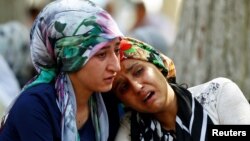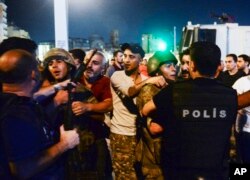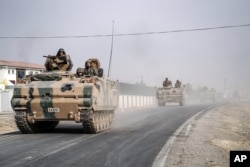In the month after a suicide bomber killed dozens of people attending a mostly Kurdish wedding in southeastern Turkey, the government has ramped up its military campaign against Islamic State (IS) militants, arresting 40 IS suspects in Istanbul and another two suspects in Sanliurfa, according to a Turkish official who spoke to VOA.
“We are moving forward,” said another high-level Turkish official. “We will continue to take all necessary steps to defeat IS.”
Turkish President Recep Tayyip Erdogan, who imposed a state of emergency in July after a failed coup attempt, has been under increasing pressure to crackdown on terrorists.
“It looks like the bloody wedding bombing act was a turning point,” said Tahsin Akdogan, a street merchant in Gaziantep who lost 10 relatives in the attack that authorities blame on IS.
The city is a known hub of terrorist sleeper cells. Islamic State smugglers working the nearby border have also added to security concerns.
Turan Efendioglu, owner of the Gurme Market in Gaziantep, said illegal trafficking has recently been curbed.
“Police are everywhere now, and that makes us feel safer,” he said.
The decision by the Turkish government to push harder to root out IS extremists has been a controversial process.
At first, Ankara said little as IS grew in 2014 — partly, analysts say, because of Islamist sympathies from Turkey’s ruling party and hopes that IS militants would help oust Syrian President Bashar al-Assad.
After IS unleashed its brutal terror regionally, including targets inside Turkey, Ankara allowed U.S.-led coalition planes on Turkish soil in 2015 to strike militants in Syria and Iraq. More IS terrorist attacks erupted inside Turkey that killed more than 200 people, including the bombing of the Istanbul airport.
Turkey’s fight against IS has been complicated by the government’s battle against Kurdish militants. Ankara is facing international criticism from human rights groups over its harsh crackdown on Kurds in eastern Turkey. And the Turkish incursion into Syria has targeted both IS and Kurdish factions in Syria that Turkey says has ties to Kurdish militants inside Turkey.
Adding to tensions was the imposition of the state of emergency following an aborted coup attempt in July. Since then, an estimated 100,000 workers in civil service, law enforcement, the military and the judiciary have been fired or suspended. More than 32,000 people have been detained, according to media reports.
The Turkish government has in the past mishandled the terrorist threat, according to Metehan Demir, a Turkish freelance journalist. He’s more hopeful now.
“Ankara changed its policy,” Demir said. “More measures will come and I believe they will break the backbone of IS in Turkey."
The government claims to have expelled nearly 4,000 foreigners it says had ties to IS. More than 50,000 people suspected of possible militancy have been banned from entering the country in the last two years, according to a Turkish official in Washington.
“Turkey sees IS as a major threat,” said Yonah Alexander, a terrorism expert at the Potomac Institute for Policy Studies in Washington. “Turkey will be able to demolish IS. It is in Turkey’s interests to do so.”
But Turkey risks a spike in terrorist attacks as Turkish forces pursue IS more vigorously, warn experts.
"IS may start to see Turkey as the real enemy,” said Ilhan Tanir, a freelance journalist.
Hasan Selim Ozertem, an analyst with the International Strategic Research Institution in Turkey, said IS will likely maintain roots in extremist elements in Turkish society.
“This kind of group, which has a substantial base among the people, can never be totally destroyed,” he said. “But it is possible to marginalize them.”
But critics say it may be too late for Ankara to act effectively against IS.
“I think these new security measures are cosmetic,” said Mahmut Togrul, an opposition member in the Turkish Parliament from Gaziantep. “I don’t believe IS has been much affected by these measures.”






